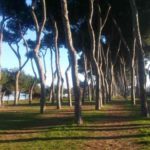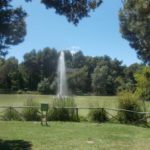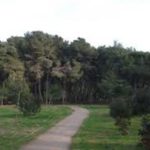This post is also available in: Italian
In 1904 and 1912, the Italian flamboyant poet and novelist Gabriele D’Annunzio, born in Pescara, staged his “The daughter of Iorio” tragedy right there: since then the beautiful pine forest south of the city of Pescara has been known as “Pineta Dannunziana” (Dannunzio’s Pine Forest).
In the VIII century AD, when it was much larger, the forest was already popular among the Byzantine sailors, as it would offer shelter from the storm on the way to and from Ravenna.
This pine forest is also known as “Pineta D’Avalos” or “Parco D’Avalos”, after the name of the family that owned the marquisate of Pescara at the time of the Bourbons. Today, it’s reduced to 131 acres, of which only 86 of the original forest have survived; since 2000 it has been acknowledged and managed as the “Pineta Dannunziana Natural Reserve of Provincial Interest”.
This pine forest is truly a wonderful place, where you can observe the changes in the environment that have taken place over the millennia. It thus offers a unique opportunity to observe the richness and variety of the vegetation and its changes as you travel inland from the beach: from the reeds on the brackish soil to the garrigue, gorse and saffron on the dunes and behind them, all the way to the pine forest and it rich Mediterranean undergrowth, the sclerophyll wood and a freshwater lake. Make sure to use bug-repellent devices when you visit the forest in the summer,
otherwise plan your visit for next spring, when the Mediterranean vegetation will spectacularly bloom. In the meantime, you can find out more by visiting Pineta Dannunziana Natural Reserve of Provincial Interest.
Worth knowing: Gabriele D’Annunzio loved visiting this pine forest whenever he came back to his hometown. Despite being inspired by this very place, his famous poem “The rain in the pine grove” was set in a wood of Versilia (Liguria Region). It has always been one of my favourite poems (although I don’t particularly like D’Annunzio), probably because it’s inspired by nature. You can find the English version below:
The rain in the pine forest
By Gabriele D’Annunzio
Silence. On the edge
of the forest no sound
of words pronounced
do I hear; but the sound
of newer words
that speak in drops and foliage
from afar.
Listen. Rain
falls from sparse clouds.
Rain on the tamerisks
all brine and chars,
rain on the pines
all scales and spines,
rain on the myrtaceae
divine,
on the genista fulgent
of flowers collected
on the juniper covered
with berries fragrant,
rain on our faces
ligneous,
rain on our hands
bare,
on our garments
light,
on our thoughts bright
that our souls share
pure,
on the lovely tale
that yesterday
misled you, that today misleads me,
oh Hermione.
Do you hear? The rain falling
on the solitary
vegetation
with a crackle that goes on
and varies in the air
with the fronds
more sparse, less sparse.
Listen. Responds
to the tears a chorus
of cicadas
whose austral sobs,
like the ashen skies,
instill no fear.
And the pine
has a sound, and the myrtaceae
another sound, and the juniper
another still, different
instruments
in the hands of many.
And immersed
are we in the spirit
of the wood,
living arboreal lives;
and your delighted features
are wet from the shower
like a flower,
and your tresses
are as scented
as dazzling genista
oh terrestrial creature
whose name is
Hermione.
Heed, heed. The harmony
of the aerial cicadas is
little by little
more subtle
beneath the tears
that spread;
but a song mingles instead
more strident
and there it rises,
from the distant humid shadows.
More subtle and fainter
it fades away, dies.
One note alone
vibrates still, and dies,
rises, vibrates, dies.
Sounds of the sea no more.
On the fronds, I hear
the pour
of silver rain
that clears,
the pour that varies
with the fronds,
more sparse, less sparse.
Listen.
The child of the air
is mute, but the child
of the distant bog,
the frog,
sings in the deepest shadows,
who knows where, who knows where!
And the rain falls on your lashes,
Hermione.
Rain falls on your dark lashes
and you seem to weep
but with joy; not white
but almost verdant
from the bark you surface.
And all of life in us is fresh
fragrant,
our hearts in our breast like peaches
intact,
between our lids our eyes
like springs among the grasses,
our teeth in their beds
like unripe almonds.
And we move from bush to bush,
now together now apart
(and the verdant feral vigour
envelops our ankles
binds our knees)
who knows where, who knows where!
And rain on our faces
ligneous,
rain on our hands
bare,
on our garments
light,
on our thoughts bright
that the soul shares
pure,
on the lovely tale
that yesterday
misled you, that today misleads me,
oh Hermione.
This post is also available in: Italian





Leave a Reply